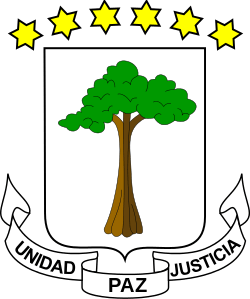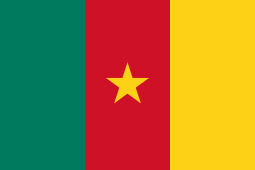Foreign relations of Equatorial Guinea
 |
| This article is part of a series on the politics and government of Equatorial Guinea |
| Administrative divisions (provinces) |
|
A transitional agreement, signed in October 1968, implemented a Spanish preindependence decision to assist Equatorial Guinea and provided for the temporary maintenance of Spanish forces there. A dispute with President Francisco Macías Nguema in 1969 led to a request that all Spanish troops immediately depart, and a large number of civilians left at the same time. Diplomatic relations between the two countries were never broken but were suspended by Spain in March 1977 in the wake of renewed disputes. After Macias' fall in 1979, President Teodoro Obiang Nguema Mbasogo asked for Spanish assistance, and since then, Spain has regained influence in Equatorial Guinea's diplomatic relations. The two countries signed permanent agreements for economic and technical cooperation, private concessions, and trade relations. President Obiang made an official visit to Madrid in March 2001, and senior Spanish Foreign Ministry officials visited Malabo during 2001 as well. Spain maintained a bilateral assistance program in Equatorial Guinea. Some Equato-Guinean opposition elements are based in Spain to the annoyance of the government in Malabo.
The government's official policy is one of nonalignment. In its search for assistance to meet the goal of national reconstruction, the government of Equatorial Guinea has established diplomatic relations with numerous European and Third World countries. Having achieved independence under UN sponsorship, Equatorial Guinea feels a special kinship with that organization. It became the 126th UN member on November 12, 1968.
Bilateral relations
 Cameroon
Cameroon
Equatorial Guinea has cordial relations with neighbouring Cameroon, although there was criticism in Cameroon in 2000 about perceived mistreatment of Cameroonians working in Equatorial Guinea. Cameroon and E. Guinea have an unresolved maritime border dispute. The majority Fang ethnic group of mainland Equatorial Guinea extends both north and south into the forests of Cameroon and Gabon. Cameroon exports some food products to Equatorial Guinea and imports oil from Equatorial Guinea for its refinery at nearby Limbe.
In December 2008, Equatorial Guinea security forces killed a Cameroonian fisherman and abducted two immigrants, Cameroon closed its border in response.[1]
Maritime disputes
- Exclusive maritime economic zone boundary dispute with Cameroon is before the International Court of Justice.
- Maritime boundary dispute with Gabon because of disputed sovereignty over islands in Corisco Bay.
- Maritime boundary dispute with Nigeria and Cameroon because of disputed jurisdiction over oil-rich areas in the Gulf of Guinea.
 China
China
The People's Republic of China and the Republic of Equatorial Guinea established diplomatic relations on October 15, 1970.[2]
 France
France
Equatorial Guinea is member of the Central African Economic and Monetary Union (CEMAC), which includes Cameroon, Central African Republic, Chad, Congo (Brazzaville), and Gabon. It also is a member of the Franc zone. Parallel to the Equatoguinean rapprochement with its Francophone neighbors, France's role has significantly increased following Equatorial Guinea's entry into the CFA Franc Zone and the BEAC. French technical advisers work in the finance and planning ministries, and agreements have been signed for infrastructure development projects.
 Nigeria
Nigeria
Equatorial Guinea has warmer relations with Nigeria, and the Nigerian President made an official visit to Malabo in 2001. The two countries have delineated their offshore borders, which will facilitate development of nearby gas fields. In addition, many Nigerians work in Equatorial Guinea, as do immigrants from Cameroon and some West African states.
 South Korea
South Korea
Establishment of diplomatic Relations between the Republic of Korea and Equatorial Guinea was on 14 September 1979. The number of South Koreans living in Equatorial Guinea in 2011 was 36.[3]
 Spain
Spain
- Equatorial Guinea has an embassy in Madrid and a consulate in Las Palmas.[4]
- Spain has an embassy in Malabo and a consulate-general in Bata.[5]
 United States
United States
In 1995, the United States closed its embassy, ostensibly for budget reasons, though the ambassador of the time had been accused of witchcraft, and had criticised the human rights situation. In 1996, offshore oil began flowing, and, with several US oil companies present in the country, the US reopened the embassy in October 2003. The US has sought to encourage the progress of human rights to the country by addressing its concerns directly to the government, as well as holding seminars for better police conduct and judicial conferences with US judges to improve the rule of law.[6]
- Equatorial Guinea has an embassy in Washington, DC.[7]
- United States has an embassy in Malabo.[8]
See also
References
- ↑ "2008 Human Rights Report". State.gov. 2009-02-25. Retrieved 2012-02-02.
- ↑ http://www.china.org.cn/english/features/focac/183538.htm
- ↑ http://www.mofa.go.kr/ENG/countries/middleeast/countries/20070804/1_24491.jsp?menu=m_30_50
- ↑ Embassy of Equatorial Guinea in Madrid (in Spanish)
- ↑ Embassy of Spain in Malabo (in Spanish)
- ↑ Archived October 4, 2010, at the Wayback Machine.
- ↑ Embassy of Equatorial Guinea in Washington, DC
- ↑ Embassy of the United States in Malabo (in English and Spanish)
External links
- Ministry of Foreign Affairs of Equatorial Guinea
- Embassy of Equatorial Guinea in London, United Kingdom
- United States Embassy in Malabo
- Honorary Consul of Equatorial Guinea and Investment Opportunities in Bucharest, Romania (Spanish)
- Curriculum Vitae of Equatorial Guinea Foreign Minister H.E. Don Pastor Micha Ondo Bile (Spanish)